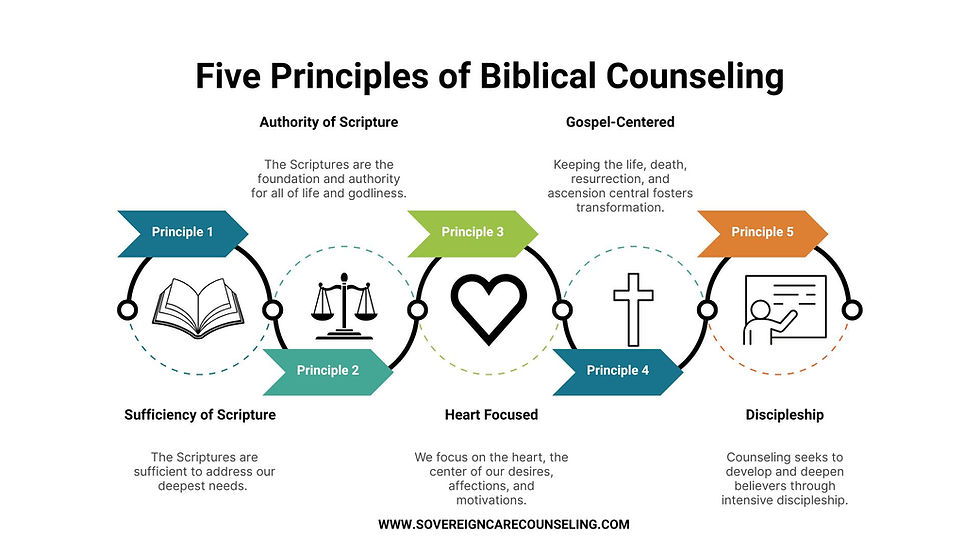Five Principles to Guide Our Biblical Counseling
- Rusty Dawson
- Aug 4, 2025
- 3 min read
I remember from 2014 to 2016 going into a new church with a recovery ministry and hopes for starting a men’s recovery home. As I emerged from a world of addiction and self-medicating, I was familiar with what many of the people we served were experiencing. One of my biggest desires then, and still is, was to help those suffering from addiction. But, as a newer Christian with little understanding of how to help, I felt lost. All I wanted was to help, but I had no idea where to start or who could guide me.
As I began researching the world of Biblical counseling, I found a lot of different organizations with their own methodologies. Still, they all shared some similarities in the importance of their basic principles. Those principles are what got me moving in the right direction. So, if you are an aspiring counselor, I want to share five of my guiding principles for Biblical counseling. I hope this helps you and gives you a good starting point.

Here are five guiding principles of Sovereign Care Counseling:
1. The Sufficiency of Scripture
The sufficiency of Scripture means that the Bible is enough to give us all the knowledge we need for salvation and living a godly life. Kevin DeYoung explains it this way: “Scripture does not tell us everything about everything, but it tells us all we need to know to make us wise unto salvation (2 Tim. 3:15).” The Scriptures are capable of addressing our deepest needs: sin and salvation. Therefore, we rely on the Scriptures to guide us in these matters.
2. The Authority of Scripture
As biblical counselors and Christians generally, we must have a final authority on matters of faith and practice. This final authority is the Scriptures themselves. Again, Kevin DeYoung is helpful here: “That’s what we mean by sola Scriptura, not that we only study the Bible but that when it comes to our final authority, we rely on the Bible alone.” We can read, learn, and draw from sources outside of Scripture, but where Scripture speaks, it has the final say.
3. A Focus on the Heart
Although we recognize physical, bodily issues, our main focus in counseling is the heart. Since the heart is the core of all our desires, affection, and motivations, we should focus on the heart and what it produces. In Matthew 15:10-20, Jesus explains the importance of the heart and the need for it to be transformed. Through the Holy Spirit, this transformation occurs.
4. Gospel/Christ-Centered
The Bible, from Genesis to Revelation, is the most incredible story ever told, and at its core is the life, death, resurrection, and ascension of Jesus Christ. As Biblical counselors, we not only need to know the story of redemption, but we must understand the centrality of Jesus Christ in this story and what that means for the church. If we miss Jesus Christ, we have missed everything, and we lead people into a false or powerless gospel, with no lasting change.
5. A Focus on Discipleship
Our counseling process should help advance the Great Commission by deepening and cultivating the believer's experience of Christ through intensive discipleship (Matt. 28:16-20). One of my goals, in any counseling situation, is to help people learn how to read Scripture better, study it, interpret it, pray it, and know Jesus more deeply. They can then help others do the same.
Principles in Practice
While this list of principles for building a counseling methodology is not exhaustive, they serve as guiding and supportive principles for a faithful approach. These five principles can provide a strong starting point for creating a counseling methodology, something I lacked early on in my journey (before any training). Many people are curious about Biblical counseling but aren’t sure where to begin. Learning more about these five principles and how they integrate into counseling is an excellent first step. I hope this proves helpful on your personal journey.



Comments